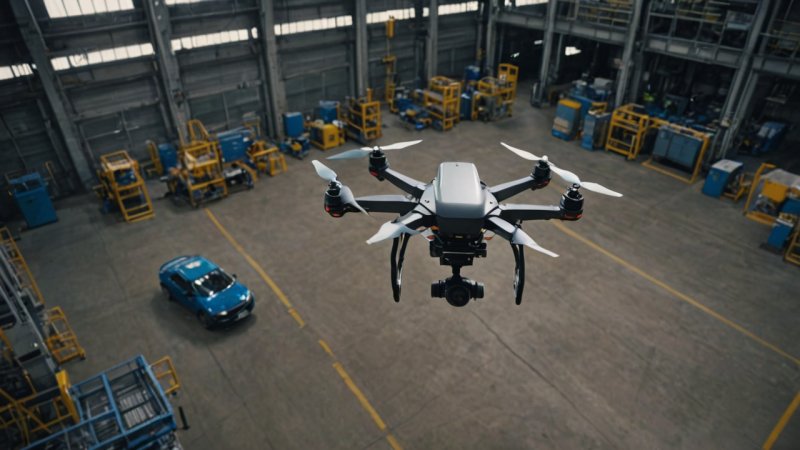The automotive manufacturing industry has always been at the forefront of adopting new technologies to improve efficiency, safety, and quality. In recent years, drones have emerged as a powerful tool that is reshaping various aspects of vehicle production. From assembly line monitoring to logistics and quality control, drones are proving to be indispensable assets in modern automotive manufacturing. This article will explore the multifaceted role of drones within the automotive sector, examining their benefits, applications, and future potential.
Understanding Drones in Automotive Manufacturing
Drones, or unmanned aerial vehicles (UAVs), are aircraft controlled remotely or autonomously. Equipped with advanced sensors and cameras, they have a wide range of applications, particularly in industries where aerial data collection and monitoring are vital. In automotive manufacturing, drones are utilized to enhance operational efficiency, improve safety, and reduce costs.
Applications of Drones in Automotive Manufacturing
1. Site Inspection and Monitoring
One of the primary applications of drones in automotive manufacturing is site inspection. Traditional methods of site inspection often involve manpower and time-consuming processes. Drones can quickly cover large areas, capturing high-resolution images and videos that provide real-time insights into the manufacturing site.
Benefits:
- Time Efficiency: Drones can survey large factory sites in a fraction of the time it would take ground crews.
- Safety: Using drones reduces the need for personnel to climb ladders or scaffolding, minimizing the risk of accidents.
- Data Collection: Drones can collect detailed data, which can be analyzed for trends and patterns in manufacturing processes.
2. Inventory Management
Efficient inventory management is crucial in automotive manufacturing, where precision and timing are key. Drones equipped with RFID readers can automate inventory checks by scanning barcodes and tracking parts in real-time.
Benefits:
- Accuracy: Drones can significantly reduce human error in inventory tracking.
- Speed: Automated inventory management speeds up the process, freeing up staff for other tasks.
- Integration: Drones can seamlessly integrate with existing inventory management systems for real-time updates.
3. Quality Control
Drones play a critical role in quality control during the automotive manufacturing process. With high-resolution cameras and thermal imaging capabilities, they can detect defects in parts and assemblies that might be missed by the human eye.
Benefits:
- Precision Inspection: Drones can provide detailed inspections without interrupting the production line.
- Consistency: Automated inspections ensure consistent quality checks across the board.
- Data-Driven Decisions: The data collected can be used to identify recurring issues and improve manufacturing processes.
4. Logistics and Delivery
Drones are also making waves in the logistics aspect of automotive manufacturing. They can transport small parts and tools across large facilities, reducing the time it takes to deliver materials to assembly lines.
Benefits:
- Cost Reduction: By streamlining logistics, drones can help companies save on labor and transportation costs.
- Efficiency: Drones can navigate complex environments, delivering items faster than traditional methods.
- Flexibility: Drones can be easily adjusted for different logistical needs, adapting to changes in production schedules.
Challenges Faced by Drones in Automotive Manufacturing
Despite their numerous advantages, the integration of drones into automotive manufacturing does come with challenges.
1. Regulatory Constraints
Various regulatory frameworks govern the use of drones, which can vary by region. Compliance with these regulations can slow down the adoption of drone technology.
2. Initial Investment Costs
While drones can save money in the long run, the initial investment in drone technology, training, and infrastructure can be significant.
3. Data Security Concerns
The use of drones raises concerns about data security and privacy, especially when sensitive information is being collected and transmitted.
The Future of Drones in Automotive Manufacturing
The future of drones in automotive manufacturing is bright, as technology continues to advance. The integration of artificial intelligence (AI) and machine learning will further enhance the capabilities of drones, allowing for even more sophisticated data analysis and decision-making.
1. Increased Autonomy
As drone technology evolves, we can expect to see more autonomous drones capable of performing complex tasks without human intervention. This will increase efficiency and reduce the need for operator training.
2. Enhanced Data Analysis
With the rise of big data, drones will be able to collect and analyze vast amounts of information, providing valuable insights that can drive improvements in manufacturing processes.
3. Broader Adoption
As more companies recognize the benefits of drone technology, we will likely see a broader adoption across the automotive industry, leading to standardization and best practices.
Conclusion
Drones are revolutionizing automotive manufacturing by enhancing efficiency, safety, and quality control. Their applications range from site inspections and inventory management to logistics and quality assurance. While challenges exist, the future of drones in this industry is promising, with advancements in technology paving the way for greater autonomy and data analysis capabilities. As automotive manufacturers continue to embrace drone technology, we can expect to see significant improvements in production processes and overall operational efficiency.






